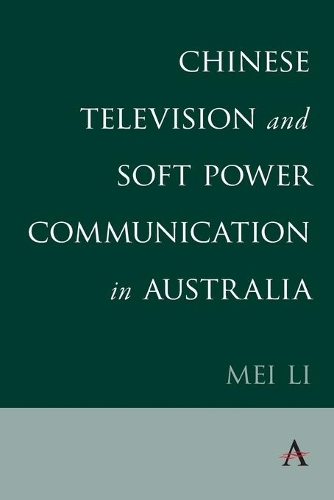
Chinese Television and Soft Power Communication in Australia
(Paperback)
Available Formats
Publishing Details
Chinese Television and Soft Power Communication in Australia
By (Author) Mei Li
Anthem Press
Anthem Press
2nd March 2021
United Kingdom
Classifications
Professional and Scholarly
Non Fiction
327.51094
Physical Properties
Paperback
210
Width 153mm, Height 229mm, Spine 26mm
454g
Description
A systemic test of the success of China's soft power message projection
Chinese Television and Soft Power Communication in Australia discusses China's soft power communication approach and investigates information handling between China and its targeted audiences in the eyes of key influencers intermediate elites (public diplomacy policy elites in particular) in China and Australia. It explores CGTN (with staff from several professional cultures) and conducts a systemic test of how successful/unsuccessful China's soft power message projection is in terms of congruence between projected and received frames as a pivotal factor of its power status. The analysis is based on a case study of frames in the messaging on Chinese international TV about China's Belt and Road Initiative and in the minds of Australian public diplomacy policy elites. The question raised is whether and how Australia is listening.
'China's fast-paced economy is reshaping the international landscape with new trade and investment infrastructure. Chinese international TV must reassure the world about China's rapid rise. Mei Li's detailed study on Chinese international TV's framing of BRI and its reception by Australian audiences is essential and edifying reading for China Watchers.' Naren Chitty, Foundation Chair in International Communication, Inaugural Director, Soft Power Analysis & Resource Centre, Faculty of Arts, Macquarie University, Australia
'At a time when China's soft power is growing and we are encouraged to suspect its 'sharp power' Mei Li provides a timely and important account of how China's international broadcasting connects with its global ambitions. Australians in particular should study Li's fascinating analysis to decide whether to welcome or remain suspicious of China's soft power drive in their country.' Gary Rawnsley, Dean, Faculty of Humanities and Social Sciences, and Professor of Public Diplomacy, University of Nottingham Ningbo China
Reviews
Chinas fast-paced economy is reshaping the international landscape with new trade and investment infrastructure. Chinese international TV must reassure the world about Chinas rapid rise. Mei Lis detailed study on Chinese international TVs framing of BRI and its reception by Australian audiences is essential and edifying reading for China Watchers.
Naren Chitty, Foundation Chair in International Communication, Inaugural Director, Soft Power Analysis & Resource Centre, Faculty of Arts, Macquarie University, Australia
At a time when Chinas soft power is growing and we are encouraged to suspect its sharp power Mei Li provides a timely and important account of how Chinas international broadcasting connects with its global ambitions. Australians in particular should study Lis fascinating analysis to decide whether to welcome or remain suspicious of Chinas soft power drive in their country.
Gary Rawnsley, Dean, Faculty of Humanities and Social Sciences, and Professor of Public Diplomacy, University of Nottingham Ningbo China
Author Bio
Mei Li holds a PhD in international communication from Macquarie University, Australia. A professional who has worked in the media industry in China, her research interests include international media and communication in the context of international relations, Chinas soft power and public diplomacy especially in Australia and countries of the Indian Ocean littoral, and journalistic professionalism in the cross-cultural context. Her research has been published in reputed international journals and presented in high-level international conferences.
